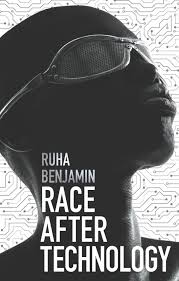Stephen Kearse at The Nation:
 The modern study of the intersection of race and technology has its roots in the 1990s, when tech utopianism clashed with the racism of tech culture. As the Internet grew into a massive nexus for commerce and leisure and became the heart of modern industry, the ills of tech workplaces manifested themselves online in chat rooms, message boards, and multiplayer video games that were rife with harassment and hate speech. Documenting these instances, a range of scholars, activists, and politicians attempted to combat these ills, but with little success. When the Simon Wiesenthal Center sent letters to Internet providers in 1996 protesting the rise of neo-Nazi websites, for example, the reply it received from a representative of the Electronic Frontier Foundation, a prominent tech lobby, channeled a now commonplace mantra: “The best response is always to answer bad speech with more speech.” Similarly, media studies researcher Lisa Nakamura documented a dismissive comment in a study of the online game LambdaMOO. In response to a failed community petition to curb racial harassment, a detractor countered, “Well, who knows my race unless I tell them? If race isn’t important [then] why mention it? If you want to get in somebody’s face with your race then perhaps you deserve a bit of flak.”
The modern study of the intersection of race and technology has its roots in the 1990s, when tech utopianism clashed with the racism of tech culture. As the Internet grew into a massive nexus for commerce and leisure and became the heart of modern industry, the ills of tech workplaces manifested themselves online in chat rooms, message boards, and multiplayer video games that were rife with harassment and hate speech. Documenting these instances, a range of scholars, activists, and politicians attempted to combat these ills, but with little success. When the Simon Wiesenthal Center sent letters to Internet providers in 1996 protesting the rise of neo-Nazi websites, for example, the reply it received from a representative of the Electronic Frontier Foundation, a prominent tech lobby, channeled a now commonplace mantra: “The best response is always to answer bad speech with more speech.” Similarly, media studies researcher Lisa Nakamura documented a dismissive comment in a study of the online game LambdaMOO. In response to a failed community petition to curb racial harassment, a detractor countered, “Well, who knows my race unless I tell them? If race isn’t important [then] why mention it? If you want to get in somebody’s face with your race then perhaps you deserve a bit of flak.”
more here.
